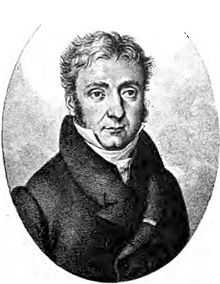Pierre Louis Dulong
| Pierre Louis Dulong | |
|---|---|
 | |
| Born |
12 February 1785 Rouen |
| Died |
19 July 1838 (aged 53) Paris |
Pierre Louis Dulong (12 February 1785 – 19 July 1838) was a French physicist and chemist, remembered today largely for the law of Dulong and Petit. He worked on the specific heat capacity and the expansion and refractive indices of gases.
Life and work
Dulong was born in Rouen, France.
An only child, he was orphaned at the age of 4, he was brought up by his aunt on Auxerre. He gained his secondary education in Auxerre and the Lycée Pierre Corneille in Rouen[1] before entering the École Polytechnique, Paris in 1801. He began studying medicine, but gave this up to concentrate on science, working under the direction of Thénard. Dulong succeeded Alexis Thérèse Petit as professor of physics, from 1820 to 1829, then was directeur des études until his death.
In chemistry, he contributed to knowledge on:
- the double decomposition of salts (1811)
- nitrous acid (1815)
- the oxides of phosphorus (1816)
- the oxides of nitrogen
- catalysis by metals (1823, with Thénard).
Dulong also discovered the dangerously sensitive nitrogen trichloride in 1812, losing two fingers and an eye in the process.[2]
In 1819, Dulong collaborated with Alexis Petit to show that the mass heat capacity of metallic elements are inversely proportional to their atomic masses, this being now known as the Dulong-Petit law.[3] In 1820, he succeeded Petit (1791-1820) as professor of physics at École Polytechnique. Dulong studied the elasticity of steam, the measurement of temperatures, and the behavior of elastic fluids. He made the first precise comparison of the mercury- and air-temperature scales. In 1830, he was elected a foreign member of the Royal Swedish Academy of Sciences.
He died in Paris and his is one of the names of 72 scientists inscribed on the Eiffel Tower. At the time of his death, he was working on the development of precise methods in calorimetry.
References
- ↑ Lycée Pierre Corneille de Rouen - History
- ↑ Thénard J. L.; Berthollet C. L. (1813). "Report on the work of Pierre Louis Dulong". Annales de Chimie et de Physique 86 (6): 37–43.
- ↑ Laing, Mary; Laing, Michael (2006). "Dulong and Petit's Law: We Should Not Ignore Its Importance". Journal of Chemical Education 83 (10): 1499–1504. Bibcode:2006JChEd..83.1499L. doi:10.1021/ed083p1499.
Further reading
- Petit, Alexis-Thérèse; Dulong, Pierre-Louis (1918). "Recherches sur quelques points importants de la Théorie de la Chaleur". Annales de Chimie et de Physique 10: 395–413. (French) English translation: "Research on some important aspects of the theory of heat" from Annals of Philosophy 14, 189 – 198 (1819).
External links
-
 Chisholm, Hugh, ed. (1911). "Dulong, Pierre Louis". Encyclopædia Britannica (11th ed.). Cambridge University Press
Chisholm, Hugh, ed. (1911). "Dulong, Pierre Louis". Encyclopædia Britannica (11th ed.). Cambridge University Press
|